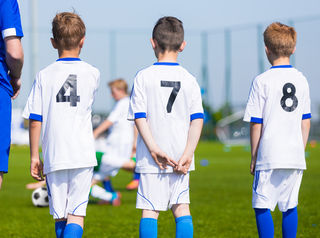Sport and Competition
The Pros and Cons of Youth Sports Aren’t Only Physical
Be mindful of a young athlete’s psychological well-being.
Posted May 5, 2017 Reviewed by Lybi Ma

Against a backdrop of increasing childhood obesity, the physical benefits of sports participation are clear. Kids today need to move more, and being on a team or involved in a sport is a great way to stay healthy. But there has also been more discussion of the physical risks that children face in sports, and with good reason. As a nation, we are coming to terms with the epidemic of knee (soccer and track), shoulder (tennis and baseball), and head (football) injuries related to specific sports. What’s talked about less often are the psychological risks and benefits related to youth sports.
While teaching “Sociology of Sport” at Northwestern University (a Big 10, Division 1 school), I did the research and heard from hundreds of students. Here are six risks and six benefits that parents of athletes of all ages should consider as they help their kids navigate the world of sport.
Psychological Risks of Youth Sports
- Self-esteem is tied to sports performance. Who your child is as a person shouldn’t be tied closely to the ability to hit home runs or score touchdowns. If it is, that’s a guaranteed set-up for feelings of failure and low self-esteem. Most young athletes feel great when they win, but it’s how they handle the loss that defines their long-term character. Remind your sporty kid that she’s always a winner in your book, even if she loses.
- Coaches who demoralize and bully. There are more wonderful coaches than those who do damage, but it would be naïve to expect all coaches to have your child’s psychological interests at heart. Too often, a win-at-all-costs mentality devastates young athletes. Be on the lookout for behaviors that humiliate your child. Does the coach rant and rave at games? Call out and embarrass players? The best coaches inspire through positive reinforcement and role modeling, not harassment and bullying.
- Delusions that sport will provide college scholarships. Too many parents believe that their child is destined to receive a Division 1 college scholarship. This is akin to playing the lottery: Don’t bank on it. Putting all your eggs in the sports basket is misguided and dangerous for your child’s emotional well-being. In addition to the statistical improbability, there is a strong chance that an athlete will face a sport-ending injury or simply burn out. Make sure that your athlete has other interests and doesn’t believe that sports are the only route to success.
- Strained relationships with over-invested parents. Have you ever said “we won” after your child’s game or match? Don’t do it. Too many parents become over-invested in their children’s athletic pursuits, which can lead to unconscious behaviors that will hurt young athletes. I’ve seen parents scream and berate their children for missing a goal or not winning a race. Love and affection should never be tied to athletic performance. In fact, children need you most when they fail to perform well.
- Unhealthy performance pressure. Sports psychologists are in high demand because parents, coaches, teams, and schools put undue pressure on young athletes to perform well every time they step on the field, court, or track. Remember, they’re children, not professional athletes. As a mom of five competitive tennis players, I understand the inclination to demand more, but kids are kids. Some days they will miss every serve just because, and other days they will look like they’re destined for greatness. Work with them to maintain perspective and understand that it’s only a game.
- Inappropriate feelings of superiority. Our society’s obsession with sports puts a premium on athletes and athleticism, which can imbue young athletes with an inflated sense of self. Schools and towns may even afford young athletes privileges and leeway that other students don’t receive. There are too many instances of successful athletes who thought they were above the law or the norms of a school. Parents need to be vigilant for signs that their young athletes lack humility and empathy. It’s up to us to make sure that sports don’t bring out the worst in our children.
Psychological Benefits of Youth Sports
- The ability to take criticism and work collaboratively. To help young athletes improve, coaches must point out mistakes and faulty technique. Learning to handle this feedback establishes a foundation for adult skill-building and collaboration. In addition, with their team and coaches, athletes learn the give-and-take of working together and managing conflict. Research suggests that athletic girls become women who are better equipped than their non-athletic counterparts to handle criticism and stress. Effective coaching and competition can help build internal resources that will serve kids well into adulthood.
- Self-esteem and efficacy. Skill-building in sport enhances self-esteem, which carries over into other areas of life. Going from not being able to make a basket to rarely missing a foul shot can boost a young person’s ego. Gaining efficacy in one arena, especially when helped by a coach or a parent, demonstrates that listening and practicing yield positive results. This self-awareness helps young athletes make an invaluable connection between their goals and effort.
- Acquisition of a work ethic. Sports require effort and commitment, both traits that serve us well in adulthood. I’ve seen how my children apply the aptitude for hard work and effort that they acquired in athletics to almost everything they do in their lives, from hobbies to academic assignments. Excelling in sport is all about the work we expend, which sets up an excellent foundation for long-term success.
- Positive body image. Our contemporary addiction to social media and adulation of seemingly “perfect”-looking people can wreak havoc on children’s body image. While not always a perfect antidote, sports can make young athletes feel proud of their bodies and what those bodies can do. Serena Williams shared that she was ashamed of her athletic frame until she won a Grand Slam and understood that her success was tied to her very strong body. Female athletes, in particular, have been shown to benefit from positive feelings about their bodies, regardless of whether they conform to society’s very rigid standards of female beauty.
- Resilience. Too many tweens and teens are unable to handle the rigors of school. They are easily overwhelmed and crumble when they do poorly in class. In fact, parents often protect their children from defeat by fiercely advocating for them, doing their homework, and even asking teachers to change poor grades. Overprotection undermines the development of resilience. Youth sports provide a nice balance since parents can’t protect athletes from defeat and hardship. It’s good for your kids to learn how to both lose and win.
- Self-regulation, organization, and time management. Combining sports and school requires an ability to self-regulate. Getting to practice on time with the proper equipment helps student-athletes learn to organize themselves and say no to other activities, such as video games, social media, and excessive socializing. Learning when to say no is a great skill to carry over to adulthood. Many Northwestern athletes shared with me that they actually got better grades during their regular season because they were forced to take a more organized approach to their schoolwork.
As parents, we should all be aware of the psychological risks that come with sport participation while reinforcing the positives. Sports are supposed to be fun. When it stops being fun and has the potential to hurt your child, it’s time to shift gears and reevaluate. However, if your young athlete is having fun, the rewards can last a lifetime.


